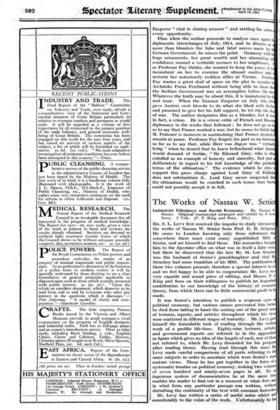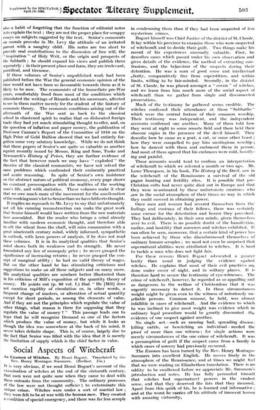The Works of Nassau W. Senio Industrial Efficiency and Social
Economy. By Nassau n Senior. Original manuscript arranged and edited by S. Leo Levy. 2 Vols. (P. S. Sing and Sons. 32s.) Ma. S. L. LEVY first received the impulse to study intensive!. the works of Nassau W. Senior from Prof. E. R. Seligma He came to London knowing only from references t somewhere there must exist many unpublished MSS. o Senior, and set himself to find them. His researches broug him to the Spectator office on what was in itself a false seen
but there he discovered that the late Mr. St. Loc Strac was the husband of Senior's granddaughter and that Mr Strachey had some trunkfuls of his MSS. The publication these two volumes presents therefore a special interest to and we feel happy to be able to congratulate Mr. Levy on very capable and sound piece of editing, and Messrs. P. S King and Sons on their willingness to publish an importan contribution to our knowledge of the history:. of econo theory, from which there can be little commercial profit to made.
It was Senior's intention to publish a magnum opus political economy, but various causes prevented him befo he died from taking in hand the sorting out of the great of lectures, reports, and articles throughout which his vie were scattered in different stages of maturity. Mr. Levy gal himself the formidable task of reading through the writt
work of a prolific life-time. attOes
and government reports are referred to in the apPendt (a figure which gives no idetiof the length of each, nor of those not referred to, which Having Levy discarded for his purposes after reading them). Having read through this mass Mt Levy made carefui comparisons of all parts referring to the same subjects in order to ascertain which were Senior's most mature views. These he has put together in the 'form of t systematic treatise on political economy, making two volumes of seven hundred and ninety-seven pages in all. By as ingenious system of documentation he at the same tins enables the reader to find out in a moment at what date and in what form any particular passage was written, without disturbing the continuity of the text with constant footnote. Mr. Levy has written a series of useful notes which add considerably to the value of the work. Unforlunately he hat also a habit of forgetting that the function of editorial notes is to explain the text ; they are not the proper place for scrappy essays on subjects suggested by the text. Senior's comments on morals provoke in Mr. Levy the attitude of an irritated parent with a naughty child. His notes are too short to provide real contributions to the discussion of free will, the " inspiration " of Holy Writ, or the origin and prospects of the Sabbath ; he should expand his views and publish them separately ; in their present place and form, they are irrelevant, pontifical, and tiresome.
If these volumes of Senior's unpublished work had been published before the War the general economic opinion of the time would not have been so favourable towards them as it is likely to be now. The economists of the immediate pre-War years, comfortably freed from most of the conditions Which stimulated the writings of Ricardo and his successors, affected to see in them matter merely for the student of the history of economic theory. The economic conditions arising out of the aftermath of the War sent us back to the classical school in chastened spirit to realize that on dislocated foreign trade they had yet much stimulating thought to offer, and, on the question of inflation and paper money, the publication of Professor Cannan's Report of the Committee of 1810 on the High Price of Gold Bullion showed that we had entirely for- gotten some very salutary knowledge. While we do not think that these papers of Senior's are quite so valuable as another reprint recently issued by Messrs. King and Sons, Tooke and Newmarch's History of Prices, they are further evidence of the fact that however much we may have " exploded " the theories of the classiCal economists, we have not -solved the same problems which confronted their eminently practical and acute reasoning. In spite of Senior's own insistence on the abstract nature of political economy, every page shows his constant preoccupation with the realities of the working man's life, and with statistics. These volumes make it clear that we owe much more of the movement for the amelioration of the workingman's lot to Senior than we have hitherto thought.
It implies no reproach to Mr. Levy to say that unfortunately not all his -cunning reconstruction can make the great work that Senior himself would have written from the raw materials here assembled. But the reader who brings a mind already familiar with modern economic thought, and therefore able to sift the wheat from the chaff, will miss communion with a great nineteenth century mind, widely informed, sympathetic in outlook, with keen powers of analysis, if he does not read these volumes. It is in its analytical qualities that Senior's mind shows both its weakness and its strength. He never formulated any law of monopoly price ; he never grasped the significance of increasing returns ; he never grasped the con- cept of marginal utility ; he had no valid theory of wages: But on the other hand he has stimulating criticisms and suggestions to make on all these subjects and on many more. His analytical qualities are nowhere better illustrated than in his criticism of Mill's exposition of the quantity theory of money. He points out (p. 80 vol. I.) that " He [Mill] does not mention rapidity of circulation or, in other words, a frequent change of masters, or alteration of actual quantity exeept for - short periods, as among the elements" of value. And if they are not the 'principles which regulate the value of other things,- whit reason is there for suppoSing that they regulate the Value of money ? " This passage leads one to hope that he will recognize Demand as one of the factors which produce the value of money, but white it looks as though the idea was somewhere at the back of his mind, it never takes definite shape. This is, of course,. largely due to. the fact that Senior was filled with the idea that it is merely the liinitation of supply which is the chief factor in value.



















































 Previous page
Previous page